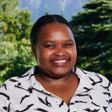
Scholar Stories
Taking the baton forward: The scholar advocating for girls' rights
Meet Isatu Bokum, the first Mandela Rhodes Scholar from The Gambia.
Isatu Bokum identifies herself as a girls’ rights advocate and a feminist first. She is the founder of an outreach programme called Girls Talk. Through her organisation, she has reached more than 10,000 girls and young women through mentorship and sensitisation programs, advocacy outreaches, career development programs, capacity building programs and media campaigns.
Isatu grew up in a polygamous family. Her father had three wives, and of his 14 children, it was only her Sierra Leonean mother’s six who received an education. Due to her mother’s ill health, their household had to move to be close to good healthcare in the city. Once in the city, her mother was adamant that her children would receive an education even though this wasn’t a popular choice in the village. Although she was already older than her classmates, Isatu was able to start school and change the trajectory of her life. She understood that she would have to work hard and seek opportunities because the polygamous nature of her family meant that resources had to be shared amongst a greater pool of people. In high school Isatu joined the debating team. This became her saving grace: her team placed second in the national championships, earning her a full scholarship to the University of The Gambia. “This was a gateway, I didn’t have to think about asking my dad for all that money,” she says with relief in her voice.
In person Isatu is friendly and full of energy. It is unsurprising when she reveals that her Enneagram profile is a seven, known as “the enthusiast” or “the adventurer”.
Isatu goes after what she wants with a rare determination but she is also cautious. When choosing a vocation Isatu felt pressure to go the medical route, but as she came into herself she realised that the arts were her truth. “I’ve always been an arts person; in middle school I was always writing scripts and poems. I would put down plays and beg my friends to act them out. I was always very good at communicating and expressing myself,” she says. She chose to study journalism and digital media, which she says has felt like an extension of her personality.
The seed for this choice was planted years earlier in primary school when she was part of a programme called The Whisper Girls. They took part in outreach and were given the opportunity to host radio talk shows on different topics affecting women and girls. This helped build her confidence in public speaking and helped her learn to articulate herself. When the proprietor of The Whisper Girls sadly passed on, Isatu noticed there was no one to do for other girls what had been done for her. At a YALI symposium held in Nigeria in 2018, Isatu met other young leaders who were championing various causes. She started to think seriously about creating an organisation like the one she had benefitted from.
“I want girls to be able to stand up for themselves in the same way my mom and other important people in my life trained me to stand up for myself.” This desire is at the heart of her efforts, and formed the beginning of her journey to starting Girls Talk. Isatu began the project by interning for a media company where she worked on her proof of concept. Girls Talk started off as a TV programme where she invited people who had ideas for projects that were pertinent to young women to be on the show. They shot two professionally produced episodes and started shopping the concept to TV stations in The Gambia. When none of them was enthusiastic, she released the videos on YouTube. A positive response online was the confirmation she needed to fully throw herself into establishing Girls Talk. To this day Isatu self-funds all activities. These include online and onsite outreach geared towards empowering girls, advocating for their rights, providing life-skills training, mentorship and trying to end harmful traditional practices like female genital mutilation and child marriage.
Participating in the MRF’s leadership development programme has allowed Isatu to understand herself better and created a sense of belonging with the other scholars. She says, “I got to open up more and be vulnerable. That has always been really difficult for me. I have learned that I am not alone: other people might have similar stories”.
Isatu aspires to be an empathetic, hands on leader who leaves an impression. On her vision for Girls Talk, years down the line she says, “These girls that I serve, I want to see them achieve more than I’ve achieved. I want to see them in MRF. I want to see them win”. In October 2021 when Isatu was being interviewed for this profile, her fate was being decided on other side of the world in Oxford. In a few weeks she would learn that she had been selected as The Gambia’s first Rhodes Scholar. Isatu lives up to her social media moniker: “dream achiever”. Her path towards this identity is a lesson in having courage in your convictions.







